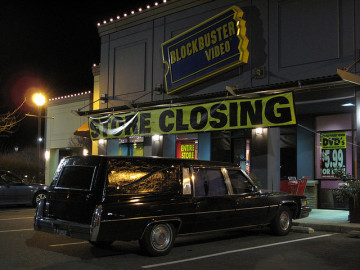Curtis Parvin: Store Closings a Sign of the Times
Thursday, February 07, 2013
Photo: Flikr/The Consumerist. Stores like Blockbuster, FYE and Borders have had no luck in stemming the tidal wave of internet shopping.
Even large companies such as Borders Booksellers have seen this happen. I believe one major factor is location. Borders was located in the Providence Place Mall. It’s a shopping center where you have to pay to park in the garage and once you’re there the timer just keeps ticking. In a weak economy, the first major resource to fluctuate are gas prices. Let’s break this down. In order to buy a book at Borders in Providence, you may need to gas up your car, pay to park and wait for a friend who may be running late.
Location is just one of the reasons for store closings. Even Borders stores that had their own free parking lots in big plazas just cannot compete with the online market. Websites such as Amazon.com are “one-stop-shopping” as a friend of mine calls it. You can buy everything you want (in less than 20 minutes sometimes), put it all into one virtual shopping cart, plug in your credit card number and a few days later, the smiling logo is waiting on your front doorstep. Still want to pay for gas, parking and deal with the crowds of a shopping mall?
GET THE LATEST BREAKING NEWS HERE -- SIGN UP FOR GOLOCAL FREE DAILY EBLASTOther companies such as FYE are sinking ships. For a while they were the one brick-and-mortar store where you could buy movies, music and video games. This media corporation is going under slowly because of online shopping. This time it is Apple that is taking the sledgehammer to these FYE stores. iTunes is destroying the market for over-the-counter CD purchases in the United States (and all over the world). The mentality of the general public seems to be: “Why spend money for gas and travel to an FYE store to buy a whole CD for $12–$20 when I could just buy the three songs I want directly from Apple for $1 apiece?” It’s just common sense operating in tandem with a tighter wallet/pocketbook.
Location is hurting FYE as well, but in a different way. While Borders and Barnes & Noble were the only two competing book stores (They sold movies and music too, but we can assume the primary reason people went there was to read.), FYE sold movies and videogames that consumers could also purchase at Walmart, Target, Best Buy, etc. The problem was the surrounding Walmarts and Targets were selling items for five and even ten dollars cheaper than FYE. If you have a Christmas list in hand, shopping at one of these surrounding stores could mean saving the money you would have paid for an entire tank of gas. We’re back to gas prices again. It’s all connected.
I suppose there is a certain degree of corporate structure that enters into economic foundering. Before the economy took a nosedive, prices were pretty much standard in all corporate stores. The problems is one of the following two things happened: Either the corporate structure of these companies was so rigid that they couldn’t adapt with the failing economy or it was too late to restructure companies as soon as the economic crisis hit.
I am not an economist, but I have worked in retail. While I cannot say for certain what’s going to happen with the economy, I have a fear that all the aforementioned business pitfalls are going to affect the spread of culture. In the digital age people have gotten too comfortable with the anonymity of technology. My concern is that if brick-and-mortar businesses continue to disappear at alarming rates there will be no reason to leave the house to exchange ideas. Foot traffic in these stores is coming to a standstill. If that happens, culture (the “real” face-to-face exchange of ideas) is in danger of stagnation.



